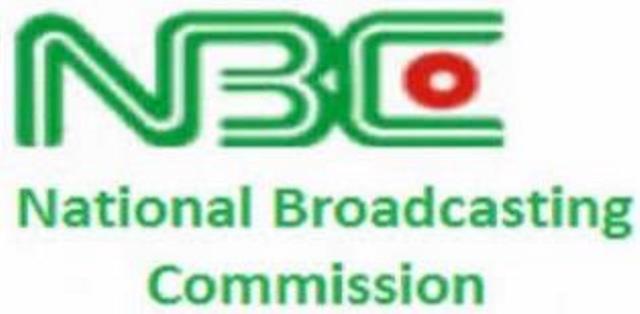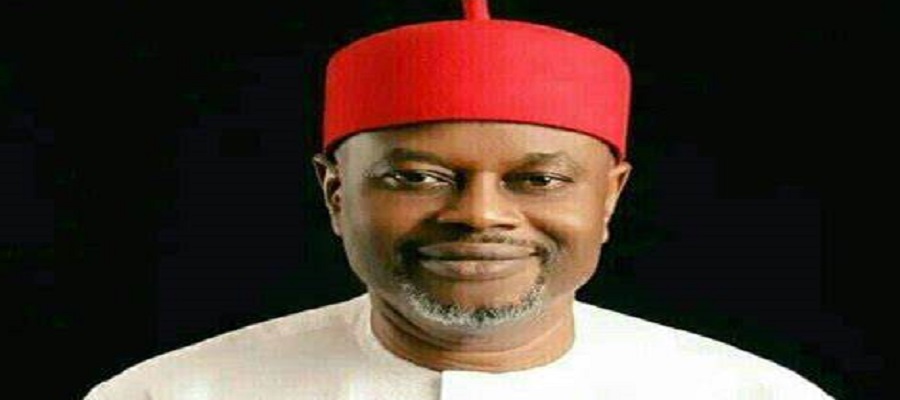Broadcasting
NBC Fines Channels, Inspiration FM N5m Each over IPOB’s Broadcast

National Broadcasting Commission (NBC) has ask Channels TV and Inspiration FM Lagos to pay a fine N5 million each for infractions of the Nigeria Broadcasting Code.

Prof. Armstrong Idachaba, acting director-general of the commission, announced this in a statement in Abuja, explained that NBC on Monday, April 26, served Channels TV a letter indicating the station’s culpability and liability for infractions of the Code in respect to its broadcast of “Politics Today” of Sunday, April 25.
Idachaba stated that the station violated Sections 3.11.1(b) and 5.4.3 of the Nigeria Broadcasting Code.
Similarly, Idachaba said that on May 2, in its World Report, Inspiration FM Lagos aired broadcast of Indigenous People of Biafra (IPOB) making secessionist claims in breach of 3.11.1(b) and 5.4.3 of the Code.
He said that the stations broadcast secessionist, divisive, violent and inflammatory comments.
According to him, Sections 3.11.1(b) and 5.4.3 of the code state the following:
“Section 3.11.1(b), the Broadcaster shall ensure that no programme contains anything which amounts to subversion of constituted authority or compromises the unity or corporate existence of Nigeria as a sovereign state.
“Section 5.4.3, in reporting conflict situations, the broadcaster shall perform the role of a peace agent by adhering to the principle of responsibility, accuracy and neutrality.”
He noted that the violations of the identified sections, being a `Class A’ offence, attracts sanctions in section 15.2.1 of the Nigeria Broadcasting Code which provides the following:

“Immediate order of suspension of broadcast services; suspension of licence and immediate shut down and seal up of transmitter, revocation of licence, seizure and forfeiture or transmitting equipment
“(In) 15.5.1: the following penalties shall apply in respect of a breach committed by the broadcaster: light, N200,000 to N500,000; heavy, N500,000 to N4,999,000; severe, N5,000,000.”
Idachaba said that there was no doubt that all over the world, countries had taken measures through regulations and the law to curb excesses.
According to him, such include the destruction of lives, property and the wanton breakdown of law characterised by negative broadcast of terrorist groups such as the IPOB.
He said that the United Kingdom Government took action against the IRA and banned it from airing inflammatory and divisive rhetoric to its use audiences.
Similarly, he said that France and other developed countries had severally taken action against terrorist groups and their determination to use broadcast materials to inflame the society.
“Following the announcements of liability to the sanctions stated in 15.1.1 and 15.1.2 both stations have accepted culpability for the infractions and earlier offered unreserved apologies for the breaches.
“The NBC has reviewed the appeals and apologies from both stations, and has decided to set aside the option of suspension of licence.
“The Commission has, however, directed both stations to pay N5 million penalty each to serve as deterrent,” Idachaba said.
The acting D-G, therefore, warned broadcasters to desist from giving voice and visibility to terrorist organisations wishing to wreak havoc on the country in the guise of freedom of speech.
The Federal High Court in Abuja declared the Pro-Biafra group, IPOB, as a terrorist and illegal group on Sept. 18, 2017.
Broadcasting
Subscriber Withdraws Suit against MultiChoice, FCCPC over Price Hike

Festus Sanmi Onifade, subscriber and legal practitioner, has withdrawn his lawsuit challenging alleged unfair price hikes by MultiChoice Nigeria Limited, filed at the Federal High Court in Abuja.

Also listed as a defendant in the suit is the Federal Competition and Consumer Protection Commission (FCCPC).
In a notice of discontinuance, dated April 1, 2025, the claimant formally informed the court of his decision to wholly withdraw the suit, marked FHC/ABJ/CS/363/2025.
However, the notice, signed by Onifade, did not advance reasons for the withdrawal.
Onifade had earlier approached the court to challenge what he described as an unfair and unjust price increase announced by MultiChoice Nigeria, slated to take effect from March 15, 2025.
In the originating summons, he asked the court to determine, among other things, whether, given Section 128 of the Federal Competition and Consumer Protection Act, 2018, and other relevant laws, the notice of the impending price increase issued by the first defendant was not unfair, unjust, grossly inadequate and a breach of his consumer rights; whether, considering the subsisting appeal in MultiChoice Nigeria Ltd & Ors v. Festus Onifade & Ors, the defendant was not stopped from further increasing the price of its services.
The suit centred on legal tussle between Onifade and MultiChoice over price hikes, which the claimant insisted were being implemented in defiance of regulatory standards and without adequate consumer engagement.
Broadcasting
Starlink, DStv, Others Pay “Peanuts” to Operate in Nigeria- Minister

Uche Nnaji, minister of Innovation, Science and Technology, has, said that the federal government has been exploring measures to curb the growing exploitation of satellite technologies, lamenting that Starlink, DStv, and a few other service providers pay ‘peanuts’ to operate in Nigeria.

According to him, some foreign investors have been known to find a way to bypass the system and deprive the government of its mandatory revenues.
The minister made the revelation at a stakeholders’ Workshop on Space Regulation organised by the National Space Research and Development Agency (NASRDA) in Abuja.
Addressing the gathering, Nnaji noted that if the regulation of space is properly handled, it would not only boost revenue, it will also whittle down the growing activities of pipeline vandals, insurgents and criminal groups.
He said, “In the near future, we will move from the $ 1 trillion economy to $ 5 trillion. So with this space regulation and licensing. Starlink and most of them, including DSTV will come here, some will pay peanuts and shortchange Nigerians. These are part of what we want to address through this space regulation and license.
“You can be sure that yearly, if we are going by what my capacity DG of NASRDA has said, we will be looking at over N200 billion annually, with annual increment of 18-20 per cent. This is just one of the initiatives coming out of the agency.”
Continuing, Nnaji said the era of satellite pay-tv or radio losing signal when it is raining will soon be a thing of the past.
The minister said they have discovered some service providers are not operating on the right bandwidths hence the loss of signal when there is a change in weather.
“All these challenges of your TV or radio not working or losing signal whenever it is raining are because the DSTV and the likes are not hosting their equipment at the right bandwidth. They will host it at the lower bandwidth, where they will not spend money on the higher bandwidth.
“But with the regulation, we will force them to move it up to where it’s supposed to be. Because if you move it up to where it’s supposed to be, you won’t have any of those problems of losing signal as soon as it starts raining. So this is part of the many reforms that are going on under this very capable man, Dr. Olumide Adepoju.
Broadcasting
Nigeria Eyes $20Bn Annual Revenue from Space Economy – Minister

Federal government has announced its target of generating over $20bn annually from Nigeria’s rapidly evolving space economy, leveraging a newly launched space security platform and comprehensive regulatory reforms.

Speaking at the launch event in Abuja on Tuesday, Chief Uche Geoffrey Nnaji, minister of Innovation, Science and Technology, unveiled the government’s strategic plans to capitalize on space technologies for national revenue generation, particularly in key sectors like oil monitoring and maritime surveillance.
“With space-based surveillance, we can detect vessels entering Nigerian waters—even those that switch off their transponders to evade detection. We’ll be able to track them, ensure compliance, and collect the appropriate fees. This initiative alone could yield over $20 billion annually,” he said.
The Minister emphasised that Nigeria’s space economy is no longer a futuristic dream but a present-day economic lever.
“Space is no longer the domain of dreamers alone—it is now the frontier of serious business, innovation, and national security,” he declared.
“Our task is clear: to establish a transparent, well-regulated ecosystem where public and private actors—from startups to established institutions—can thrive,” he added.
The new space security platform is tied to the enforcement of Nigeria’s 2015 Regulations on the Licensing and Supervision of Space Activities.
Section 4(1), mandates that no one “shall carry out activities to which the Regulations apply except under the authority of a license granted by the National Space Council.”
These regulations aim to hold local and foreign operators—such as Starlink and DSTV—accountable under Nigerian law.
“Currently, some pay appropriate fees, while others contribute minimally, shortchanging Nigerians. This new regulatory framework will address that imbalance,” Nnaji stated.
Dr. Matthew Adepoju, director general, National Space Research and Development Agency (NASRDA), echoed the Minister’s sentiments, highlighting the economic, security, and youth empowerment potential of the sector.
“Nigeria must remain a forward-thinking nation. We must ensure that space activities within our jurisdiction are properly regulated, commercially optimized, and aligned with international best practices,” Adepoju said.
According to NASRDA, Nigeria can generate about N200bn annually from space-related activities, with potential growth rates of 18–20 per cent per year.
The workshop, which gathered key stakeholders from government, academia, and the private sector, marks a pivotal shift in Nigeria’s approach to space as a tool for development.
It also underscores the urgency to reform existing legal frameworks.
Dr. Olisa Agbakoba, legal expert, who also spoke at the event, criticized Nigeria’s outdated space laws.
“Our current laws are outdated. The NASRDA Act is not a true space law. We need a clear economic strategy for space, legal reform, and an updated National Space Policy,” he said.
Agbakoba proposed creating a Center for Space Law and emphasized that space should contribute at least 2% to Nigeria’s GDP.
“Let’s learn from countries like the UAE. Why not aim for Nigerian astronauts—male and female?” he asked.
Mrs. Esuabana Asanye, permanent secretary of the Ministry, while unveiling the new NASRDA logo, positioned the current phase as a new era in Nigeria’s space journey: “We are now turning the page from the first 25 years, and ushering in a new era—one that will redefine Nigeria’s presence in space.”

 Broadcasting3 days ago
Broadcasting3 days agoStarlink, DStv, Others Pay “Peanuts” to Operate in Nigeria- Minister

 E-Financial3 days ago
E-Financial3 days agoNigeria to Exit Grey List Soon – SEC

 E-Business3 days ago
E-Business3 days agoReliance Infosystems Urges C-Suite Executives to Embrace AI

 General News2 days ago
General News2 days agoAFD Commits €3m to Africa’s Financial Inclusion

 E-Business3 days ago
E-Business3 days agoFG to Make Citizen Registration Mandatory under any Circumstance

 News3 days ago
News3 days agoZinox Technologies, TETFUND Collaborate for Tech-Driven Sustainable Future in Tertiary Schools

 E-Business3 days ago
E-Business3 days agoSecurity Operatives Arrest Suspects behind Illegal NIN Collection in Exchange for Money

 E-Business3 days ago
E-Business3 days agoFG to E-Visa System in May 1 to Boost Border Security, Streamline Travel



























